This article was medically reviewed by Michael Warner, MD. Dr. Warner is a practicing Internal Medicine Physician and Medical Director in Toronto. In addition to his medical practice, he runs AdvisoryMD, a consultancy that bridges medicine and business and serves to connect other physicians with real estate space, personal finance education, and career coaching. He received his MD from Queen's University School of Medicine in 2004 and his MBA from the University of Toronto Rotman School of Management in 2010.
There are 9 references cited in this article, which can be found at the bottom of the page.
This article has been viewed 105,584 times.
Experts say that esophagitis is the inflammation of the esophagus, the tube that carries food from your mouth into your stomach.[1] When the sphincter muscle at the top of the stomach is weakened, it opens up to allow acid into your esophagus, causing pain and irritation. Researchers note that if you have been diagnosed with esophagitis, it is very important that you treat it quickly for a better chance of a full recovery.[2] However, the approach to your treatment will depend on the cause of the esophagitis, so you should talk with your doctor before starting treatment.
Steps
Treating Esophagitis Caused by Reflux
-
1Know that acid reflux is the most common cause of esophagitis.[3] This is when stomach acid flows upward into your esophagus causing irritation to the bottom of the esophagus. Common symptoms include:
- Pain with swallowing
- Difficulty swallowing, particularly solid foods
- Heartburn
- A cough
- Occasionally nausea or vomiting, a fever, or abdominal pain.[4]
-
2Remove any trigger foods from your diet. Acid reflux is often brought on by foods that are causing your stomach and esophagus duress--these foods are also known as trigger foods. Try removing these foods from your diet to see if your reflux will benefit. If you want to try this method, don’t remove only one food at a time; there is commonly more than one trigger food, and it will be hard to figure out which foods are harming you. Instead, remove all of the trigger foods for at least two weeks, then add back one food at a time every three days; any foods that cause reflux symptoms should be permanently removed from the diet, or greatly limited.[5]
- Common trigger foods include caffeine, chocolate, alcohol, peppermint, tomatoes, oranges, spicy foods, and high-fat foods.
- It is also better to eat smaller more frequent meals rather than larger meals.[6] This can help to diminish feelings of heartburn.
Advertisement -
3Quit smoking. If you are a smoker, now may be the time to consider quitting or at least cutting back. Smoking has been shown to contribute to esophageal disease, including feelings of heartburn.[7] Speak to your doctor if you would like support in quitting smoking (including the option for nicotine replacement and/or medications such as Wellbutrin that can diminish cravings).
-
4Lose weight. Being overweight or obese has also been correlated to increased heartburn, so now may be the time to get our for a walk each day and to begin an exercise program.[8] Weight loss is not only helpful for your esophageal problems, but also benefits your overall health and wellbeing in many other ways.
- Speak to your physician if you would like support or guidance getting started on an exercise program, and always consult your doctor first if you are worried you may have any health restrictions that hold you back from exercise.
-
5Remain upright for at least 30 minutes after eating. When you have a big meal and then lie down, it makes digesting the food much more difficult. If your esophagus is damaged, there is also a much larger chance that acids from your stomach will leak back up to your esophagus when you lie down.[9]
- If you find you have symptoms of heartburn at night, it can be helpful to raise the head of your bed of to sleep with more pillows.[10] Elevating your head more while you sleep keeps you in a more upright position, which can significantly diminish feelings of heartburn.
-
6Take over-the-counter reflux medication. Tums is a good first choice, and if this doesn't work for you there are stronger options available over-the-counter as well.[11]
-
7Monitor how long you take these over-the-counter medications for. If you are taking any of these over-the-counter medications for two weeks or more, make sure to visit your doctor and tell him or her about the medication use. If your reflux is still occurring after changing your diet and using the over-the-counter medications, visit your physician for appropriate diagnosis and treatment.
- At this point, your physician may offer you stronger prescription anti-reflux medications to help with your esophagitis. (examples)[14]
- It is also key to establish the correct diagnosis, for different diagnoses require different forms of treatment.[15] This is why it is key to see your doctor if you do not notice any improvement on over-the-counter medications.
Treating Esophagitis Caused by Medication
-
1Drink a full glass of water when you take the medication. If you are suffering from esophagitis because of a medication you are taking, you may be able to combat the problem by drinking a full glass of water when taking the pill. Sometimes, “pill esophagitis” is due to the medication remaining in the esophagus for a period of time and irritating it, rather than passing directly to the stomach.[16]
- Another option is to opt for a liquid form of the medication you are taking, rather than pill form, if it is available in liquid form as well.[17] This can help to reduce pill-related symptoms of esophagitis.
- It is also advised to sit or stand for at least 30 minutes after taking your pill. Lying down immediately after has been shown to increase symptoms of heartburn.[18]
-
2Talk to your doctor about finding an alternative prescription. If drinking a glass of water with each pill does not work, you may need to stop taking this prescription and start on a different treatment plan. It is very important that you talk to your doctor before you stop taking your treatment.
- Many medical conditions are able to be treated with more than one type of medication; speak to your doctor if alternate treatments are available that are less irritating to the esophagus.[19]
-
3Stop taking over-the-counter pain killers. If you are taking aspirin or NSAIDs on a regular basis and are suffering from esophagitis, you should stop taking these. Visit your physician first, to make a plan for stopping the medications gradually; stopping them suddenly may cause “rebound” inflammation and pain, while slowly weaning off of them can avoid this situation. You should also discuss the symptoms that caused you to be taking these medications, so that a diagnosis and an alternate treatment plan can be devised.[20]
- Over-the-counter pain killers have been reported to cause increased symptoms of heartburn in some patients, which is why it is important to be careful about taking these and to consult your doctor if you think they may be worsening your condition.
Treating Eosinophilic or Infectious Esophagitis
-
1Take "topical oral steroids" to treat eosinophilic esophagitis.[21] Eosinophilic esophagitis is brought on by an allergic reaction to a food that you are allergic to. The allergic reaction causes your esophagus to become inflamed and damaged.
- Steroid medication helps to reduce or eliminate unnecessary immune reactions such as occurs with eosinophilic esophagitis.
- Similarly to how inhaled steroids are used to treat asthma, "topical oral steroids" are thought to coat the surface of your GI tract in a way that prevents irritation.[22]
- The other advantage of "topical oral steroids" is that they are not absorbed into your bloodstream, so you avoid the typical side effects of steroid medications.[23]
-
2Have your doctor do an allergy test to treat eosinophilic esophagitis.[24] Oftentimes the culprit for eosinophilic esophagitis is an adverse allergic reaction to a particular food. In order to determine the "culprit food," it is recommended to remove suspicious foods from your diet (your doctor can tell you which foods are most likely to be culprits), and to add them back in slowly, monitoring for any reactions or signs of heartburn.[25]
- It is important to add back only one food at a time, otherwise you will not be able to tell which one caused you symptoms of heartburn.
-
3Treat the organism causing infectious esophagitis. For infectious esophagitis, medications will be prescribed according to the organism causing the infection.[26]
- If it is yeast Candida, the treatment is fluconazole or an echinocandin. The chosen medication depends on the strain of Candida and on the individual patient, including how ill he or she is, whether other illnesses are also present, allergies, and other factors.
- If the patient has a viral esophagitis, acyclovir, famciclovir, or valacyclovir will be prescribed. Again, the particular choice depends on the patient and on the virus.
- If it is caused by a bacteria, antibiotics will be prescribed.[27]
References
- ↑ https://www.mayoclinic.org/diseases-conditions/esophagitis/symptoms-causes/syc-20361224
- ↑ https://www.mayoclinic.org/diseases-conditions/esophagitis/diagnosis-treatment/drc-20361264
- ↑ http://www.webmd.com/digestive-disorders/tc/esophagitis-topic-overview
- ↑ http://www.webmd.com/digestive-disorders/tc/esophagitis-topic-overview
- ↑ Levine MS, Macones AJ Jr, Laufer I. Candida esophagitis: accuracy of radiographic diagnosis. Radiology. Mar 1985;154(3):581-7
- ↑ http://www.webmd.com/digestive-disorders/tc/esophagitis-topic-overview?page=2
- ↑ http://www.webmd.com/digestive-disorders/tc/esophagitis-topic-overview?page=2
- ↑ http://www.webmd.com/digestive-disorders/tc/esophagitis-topic-overview?page=2
- ↑ Graman PS. Esophagitis. In: Mandell GL, Bennett JE, Dolin R, eds. Principles and Practice of Infectious Diseases. 7th ed. Philadelphia, Pa: Elsevier Churchill Livingstone; 2009:chap 94
- ↑ http://www.webmd.com/digestive-disorders/tc/esophagitis-topic-overview?page=2
- ↑ http://www.webmd.com/digestive-disorders/tc/esophagitis-topic-overview?page=2
- ↑ http://www.webmd.com/digestive-disorders/tc/esophagitis-topic-overview?page=2
- ↑ http://www.webmd.com/digestive-disorders/tc/esophagitis-topic-overview?page=2
- ↑ http://www.webmd.com/digestive-disorders/tc/esophagitis-topic-overview
- ↑ http://www.webmd.com/digestive-disorders/tc/esophagitis-topic-overview
- ↑ Brown-Whitehorn TF, Spergel JM. The link between allergies and eosinophilic esophagitis: implications for management strategies. Expert Rev Clin Immunol. Jan 1, 2010; 6(1): 101.
- ↑ http://www.mayoclinic.org/diseases-conditions/esophagitis/basics/treatment/con-20034313
- ↑ http://www.mayoclinic.org/diseases-conditions/esophagitis/basics/treatment/con-20034313
- ↑ http://www.mayoclinic.org/diseases-conditions/esophagitis/basics/treatment/con-20034313
- ↑ http://cid.oxfordjournals.org/content/48/5/503.1.full
- ↑ http://www.mayoclinic.org/diseases-conditions/esophagitis/basics/treatment/con-20034313
- ↑ http://www.mayoclinic.org/diseases-conditions/esophagitis/basics/treatment/con-20034313
- ↑ http://www.mayoclinic.org/diseases-conditions/esophagitis/basics/treatment/con-20034313
- ↑ Graman PS. Esophagitis. In: Mandell GL, Bennett JE, Dolin R, eds. Principles and Practice of Infectious Diseases. 7th ed. Philadelphia, Pa: Elsevier Churchill Livingstone; 2009:chap 94
- ↑ http://www.mayoclinic.org/diseases-conditions/esophagitis/basics/treatment/con-20034313
- ↑ http://cid.oxfordjournals.org/content/48/5/503.1.full
- ↑ http://www.mayoclinic.org/diseases-conditions/esophagitis/basics/treatment/con-20034313
About This Article
To cure esophagitis caused by acid reflux, remove trigger foods like caffeine, alcohol, spicy foods, and high fat foods from your diet for 2 weeks. Then, add them back one at a time every 3 days so you can see which ones cause symptoms and remove them permanently. Additionally, after eating a meal, remain upright for at least 30 minutes afterwards so your food can digest properly. If you’re a smoker, consider quitting since smoking has been shown to contribute to esophagitis. For more advice from our Medical co-author, including how to identify symptoms of acid reflux, keep reading!
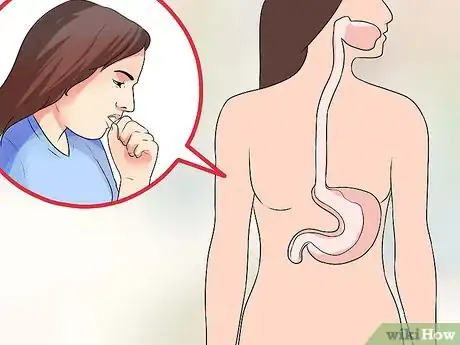
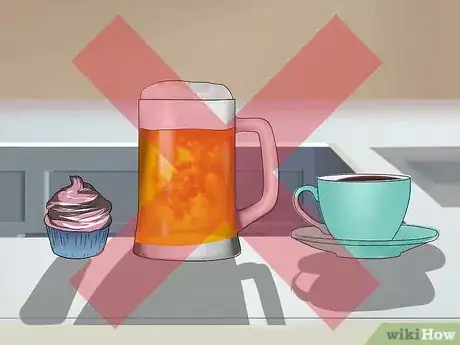
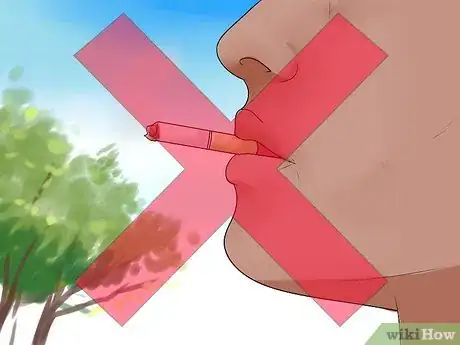
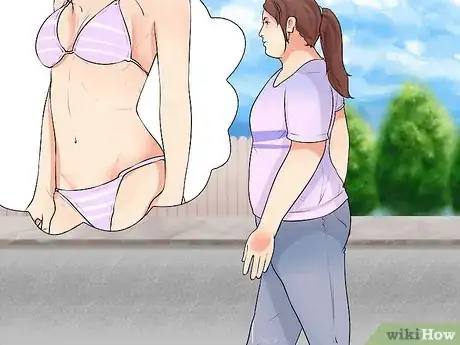
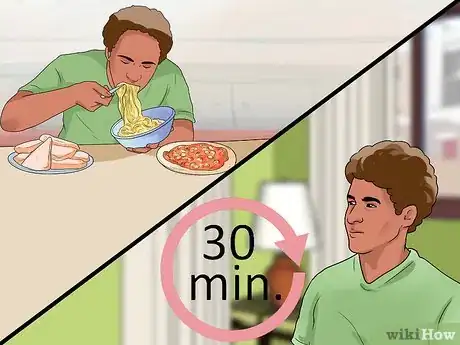

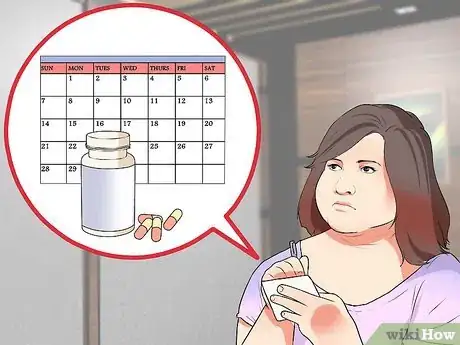
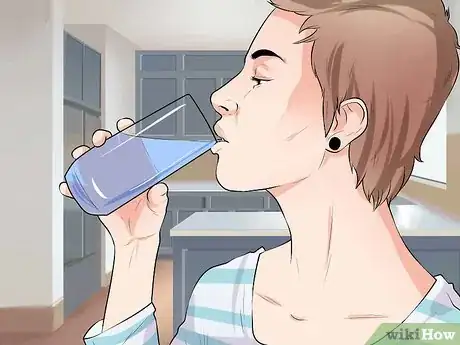
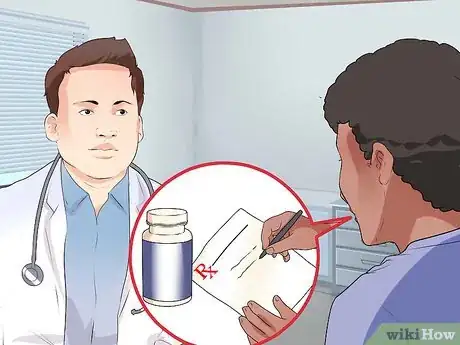
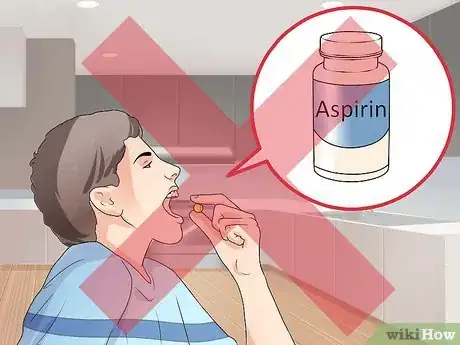
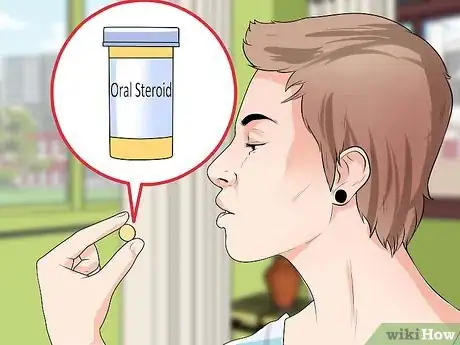
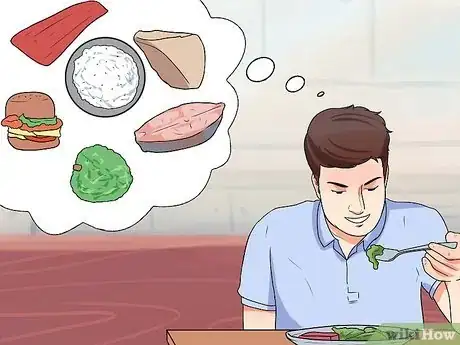
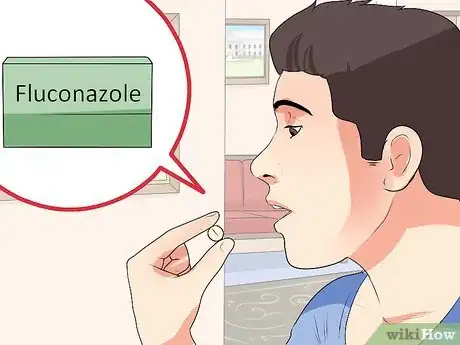
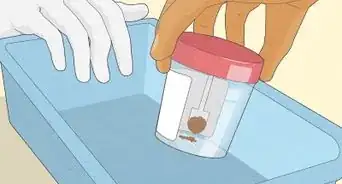
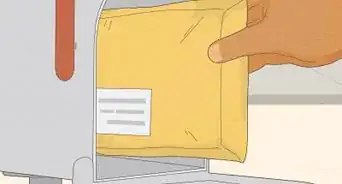

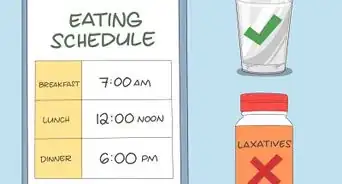
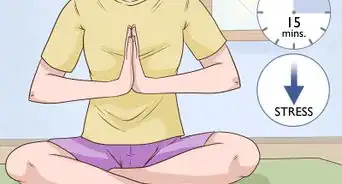
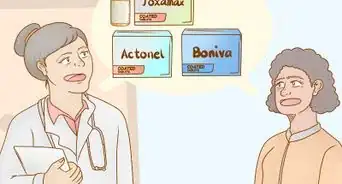
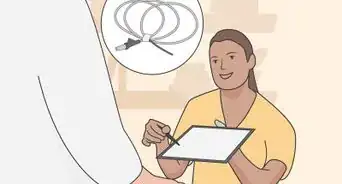
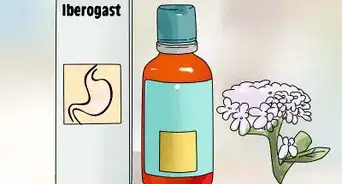

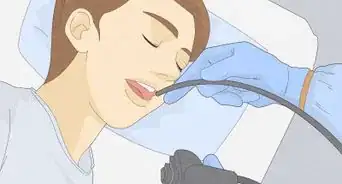
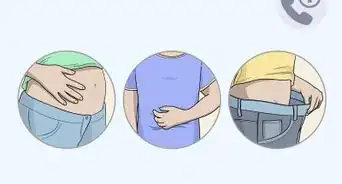
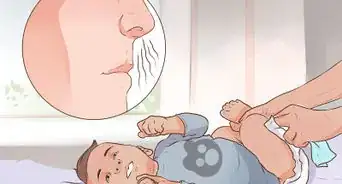
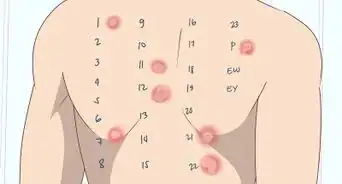








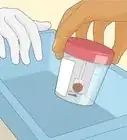
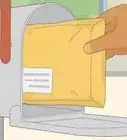

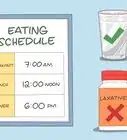



































Medical Disclaimer
The content of this article is not intended to be a substitute for professional medical advice, examination, diagnosis, or treatment. You should always contact your doctor or other qualified healthcare professional before starting, changing, or stopping any kind of health treatment.
Read More...